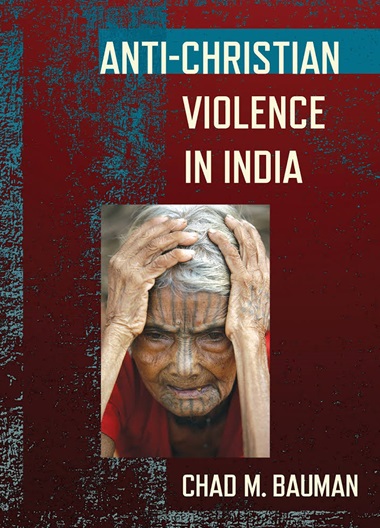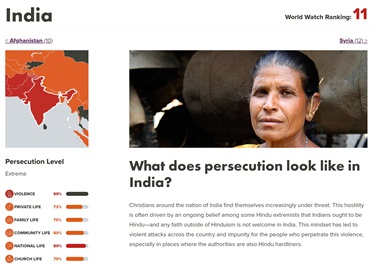
Chad Bauman will be speaking at Trinity Western University March 20.
India was ranked 11th on Open Doors’ World Watch List 2024, an “annual ranking of the 50 countries where Christians face the most extreme persecution.”
That and the fact that we have a large South Asian population in the Metro Vancouver / Fraser Valley region (not to link the two matters) means Dr. Chad Bauman’s upcoming Anti-Christian Violence in Contemporary India lecture will be a valuable opportunity to learn.
Bauman will be speaking at Trinity Western University next Wednesday evening (March 20), as a a guest of the International Institute for Religious Freedom – Vancouver and the Religion in Canada Institute.
World Watch List
Open Doors wrote about India:
Christians around the nation of India find themselves increasingly under threat. This hostility is often driven by an ongoing belief among some Hindu extremists that Indians ought to be Hindu – and any faith outside of Hinduism is not welcome in India. This mindset has led to violent attacks across the country and impunity for the people who perpetrate this violence, especially in places where the authorities are also Hindu hardliners.
More and more states are also implementing anti-conversion laws, creating an environment where any Christian who shares their faith can be accused of a crime, intimidated, harassed and even met with violence. Additionally, this hasn’t stopped mass ‘homecoming’ campaigns whereby Hindu nationalists put tremendous pressure on Christian converts from Hinduism, telling them to return to their previous faith.
 The world watched in horror as the persecution in India worsened when ethno-religious violence erupted in May 2023 in the northeastern state of Manipur.
The world watched in horror as the persecution in India worsened when ethno-religious violence erupted in May 2023 in the northeastern state of Manipur.
What began as a dispute between ethnic groups took on a disturbing religious dimension, as Christians were targeted across the ethnic groups. Thousands of Christians were displaced, dozens of churches were burned down and many believers were killed. It was a sobering reminder of how dangerous it can be to be a Christian in India.
India also witnessed mob attacks against thousands of Christians in Chhattisgarh State in January 2023. Thousands of Christians were chased out of their homes and villages. They had to take shelter in indoor stadiums and other locations.
Complex situation
Bauman, author of Anti-Christian Violence in India (Cornell University Press, 2020), notes that Open Doors is not alone in its assessment of the situation in India, and agrees that the issue is a serious one. He notes in the book that “since the late 1990s . . . anti-Christian violence has very much been on the rise.”
Observers often point out that persecution of Christians worldwide is under-reported. That might be even more so with regards to India; Bauman provides some insights:
Because the everyday forms of violence against Christians go largely unnoticed, when incidents of anti-Christian violence do garner international media attention, those who learn about them outside of India are often shocked and mystified, in part because of the tolerance and peacefulness that many romantically associate with Gandhi, with Hinduism, with yoga (in its many popularized forms) and therefore with India and its citizens.
They may not be aware of the rise of such groups as “the Hindu Nationalist Sangh Parivar (or Sangh, with which the ruling Bharatiya Janata Party – BJP – is itself associated).”
But the situation in India is complex. As Bauman wrote in a comment accompanying the book on the Cornell site:
The point is not to downplay the severity of anti-Christian violence in India . . . The point, rather, is to note a discrepancy in how western organizations and governments often evaluate their own versus others’ records with regard to religious freedom.
This discrepancy itself contributes to the marginalization and harassment of Christians around the world, including in India, because an important and often overlooked factor in the growth of Hindu-Christian tension is the perception among many Indians that western ‘Christian’ nations and governments are intent on foisting upon Indians their western forms of secular modernity, forms that travel along with putatively universally valid conceptions of ‘secularism,’ ‘religion’ and ‘religious freedom,’ and that implicitly construct as superior in all contexts typically western arrangements of secular governance.
However, because many Indians consider these conceptions to be parochially Christian in origin, rather than universally valid, they perceive the global power and growth of Christianity (particularly the growth of Christianity in India) as a potential threat to the possibility of constructing an indigenously appropriate form of secular and tolerant governance, that is, as a threat to their own sovereignty and right of self-determination.
Anti-Christian Violence in India was among the books I considered, but did not address, in the seven-part series on Christianity: A Missionary Religion, which I just completed last week. Bauman raises issues related to missionary activity which are still being widely debated.
Those antagonistic or ignorant regarding missions will often over-emphasize the overlap between colonialism and missions (often missing what Bauman points to – that secularism can also have a western cast), while those sympathetic to the movement often minimize or at least avoid the topic.
Bauman continued:
While there are many factors that contribute to the targeting and marginalization of Christians in India, then, including both the ascendancy of politicians willing to stoke interreligious strife for political gain and widespread exasperation with aggressive Christian projects of proselytization, it is important that we also understand it as a manifestation, in part, of an indirect form of resistance to the potential imposition of western models of secular modernity in which Christianity is both historically and currently implicated.
His book was well received by a wide range of reviewers, For example:
- Foreign Affairs: “Bauman enters deeply into the thinking of Hindu nationalists to show that their acts of violence against Christians are motivated not by disputes over doctrine but by an even more basic clash over the role of religion.”
- Rev. Vijayesh Lal, General Secretary, Evangelical Fellowship of India: “One hopes that this would encourage more attention to this oft ignored facet of contemporary India which is currently being torn apart on issues of identity and belongingness.”
International Institute for Religious Freedom – Vancouver
 The International Institute for Religious Freedom – Vancouver (IIRF-V) serves as the North American affiliate for the International Institute for Religious Freedom (IIRF).
The International Institute for Religious Freedom – Vancouver (IIRF-V) serves as the North American affiliate for the International Institute for Religious Freedom (IIRF).
Hosted by the Religion in Canada Institute of Trinity Western University, “the IIRF is an institute of the World Evangelical Alliance. It serves as a network of professors, researchers, academics and university institutions from all continents. We work to establish reliable data on the violation of religious freedom worldwide and seek to implement this topic in college and university programs and curricula.”

Janet Epp Buckingham is Director of the IRRF Vancouver office.
Janet Epp Buckingham, Professor Emerita of Political Studies and History at TWU, and Paul S. Rowe, Professor of Political and International Studies at TWU, are connected with both the IIRF-V and RCI.
Buckingham is Director of the IRRF-V. She has served as the Director of Global Advocacy for the World Evangelical Alliance since July 2021. She is also the Executive Editor of the International Journal for Religious Freedom, the flagship publication of the IRRF. I have posted several articles by and about her.
Rowe is Director of the Religion in Canada Institute and a senior research fellow with the IIRF-V. He conducts research into Christians, pluralism and religious freedom in the Middle East and South Asia; religious freedom worldwide, religion and global politics. I have posted articles by Paul Rowe, including this comment: ‘Closing of Compassion India shows disrespect for pluralism and democracy.’
